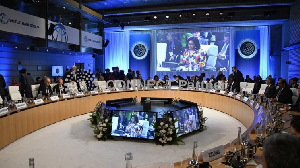 Members arrive for a meeting of the World Bank Development Committee PHOTO | REUTERS
Members arrive for a meeting of the World Bank Development Committee PHOTO | REUTERS
African countries are pushing for a platform at the United Nations that would provide them an opportunity to discuss global tax rules on an equal footing.
The tax rules would enable them to address issues such as tax avoidance, double taxation, tax evasion, and illicit financial flows.
Last September during the United Nations General Assembly, developing countries pushed for the inclusion of the United Nations Framework Convention on International Tax Cooperation.
The UNFCITC is a proposed new legal instrument intended to better coordinate international tax policy.
The UN tax framework aims at making international tax cooperation fully inclusive and more effective.
“This Convention is a fight for developing countries to reclaim their taxing rights,” said Jane Nalunga, Executive Director, Southern and Eastern Africa Trade Information and Negotiations Institute.
“For now the global tax system and international rulemaking is controlled by the OECD, which is an exclusive club, inside which developing countries do not have a voice.”
Countries voted 125 to 48 to adopt a resolution tabled by Nigeria in September 2023, on behalf of African member states, calling for a UN tax convention that could drastically change how global tax rules are set.
Nine countries including the UK, the US, and the entire European Union bloc abstained from the vote, which was held in New York on November 22.
The unprecedented step is the latest development in a heated debate over whether the United Nations can deliver better representation on international tax matters for developing countries than the Organisation for Economic Co-operation and Development.
“The UN Tax framework will enable developing countries to discuss global tax rules on an equal footing. So it is an issue of transparency, inclusion and being on the table. This will ensure that the taxing rights of developing countries are not sidelined. In fact, many OECD countries voted against the Resolution,” said Nalunga in an interview on the sidelines of the World Bank/IMF Spring meetings that are currently taking place in Washington D.C.
“For example, there is a fight about where taxation of economic activities should take place with the developing countries insisting that taxation should take place where economic activities are. Therefore the Convention is basically about enabling developing countries to defend their taxing rights.”
Global tax governance remains the principal way through which nations globally can address issues such as tax avoidance, double taxation, tax evasion, and illicit financial flows.
“Global tax governance requires nations to discuss tax rules in a neutral place where voting power is equal and where the interests of developing countries like Kenya can be articulated. At present only the UN offers this platform,” said Francis Kairu policy officer at Tax Justice Network Africa.
“African countries are facing cash crunches, rising debt, inability to finance crucial public services. All this happens as multinationals continue milking resources from Africa. This push at the UN is one opportunity that Africa is using to advance its cause and seek a new form of multilateralism.”
Developing nations have been pushing for a greater UN role after growing frustrated at global tax negotiations coordinated by the Paris-based OECD that have remained archaic.
“Taxation has changed with challenges of taxing digital services, difficulties of taxing multinational companies and an increase in tax evasion,” said Kairu.
The United Nations Tax Cooperation plays a crucial role in supporting the development of countries, especially those in the developing world.
Some key reasons why the United Nations Tax Cooperation is important for developing countries include deducing illicit financial flows such as tax evasion, money laundering, and corruption, and drain significant resources from developing countries.
“The United Nations Tax Cooperation works to combat these illicit practices by promoting international cooperation and information exchange among countries,” said Faides Tembetemba executive director at the Civil Society for Poverty Reduction in Zambia.
In Africa, when the report of the High-Level Panel on Illicit Financial Flows from Africa that was chaired by former South African President Thabo Mbeki was released, they estimated a loss of $50 billion annually, on the back of the over one trillion dollars Africa had lost in the three decades prior.
Since the report, illicit financial flows have almost doubled to $90 billion, equivalent to 3.7 per cent of its GDP.
These are funds that can be utilised in key sectors such as health, education, and social protection to reduce inequality and improve the living standards of many of the African poor.
“Developing countries often lack the necessary expertise and resources to effectively administer their tax systems and implement international tax standards,” said Tembetemba.
“The United Nations Tax Cooperation offers capacity building programmes and technical assistance to help developing countries strengthen their tax administrations, build the skills of tax officials, and improve compliance mechanisms.”
This support enables developing countries to effectively implement tax policies, enforce tax laws, and collect revenues efficiently.